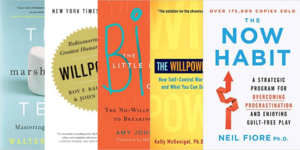
It helps us stay focused, deal with distractions adaptively, and accomplish what we intend to do, among many other things.
You are reading: Best self discipline books
Some researchers have linked self-discipline to achievement, others to well-being, and still others argue that it is a precious and finite resource.
If you’re interested in learning more about what self-regulation looks like and how you can improve it, this article includes some of the best books on self-discipline and self-control to help you make your own informed decisions. some fall into the “personal development” category, while others provide a bit more academic coverage of the concepts involved.
Keep reading to find something you like, and let us know any personal recommendations you might have in the comments below.
Before we continue, we thought you might like to download our three self-compassion exercises for free. These detailed, science-based exercises will not only help you increase your self-compassion and kindness, but will also give you the tools to help your customers, students, or employees show more self-compassion. .
4 best books on self-discipline and self-control
since mischel’s marshmallow test in the late sixties, we’ve learned a lot more about how willpower works and what it looks like. has created a buzzing market for more (and more) self-help books designed to equip readers with useful tactics, motivation, and insights into their habits.
In this section, a combination of popular self-help books on self-discipline and control topics are provided. We’ve made these recommendations with the average “you and me” in mind, and they’re not overly academic by any means unless otherwise noted.
perfect for a summer read or a less tedious morning commute. Plus, after you’ve selected a great book, head over to the self-discipline exercises for even more inspiration and encouragement.
1. mindset: the new psychology of success – carol s. fool
This is considered the seminal work on the growth mindset for the layman. If you’re looking to read about self-control as part of a larger picture of personal growth, this book provides exactly that.
Professor Carol Dweck is highly respected in the field of positive psychology for her extensive contributions to the scientific literature on motivation, intelligence, and mindset, among other things. In this simple yet highly insightful read, she is an excellent introduction for anyone who wants to learn about the fixed mindset and the growth mindset.
dweck’s work on the latter is highly relevant to all who are interested in the role of hard work, effort, and practice in personal growth. In this sense, it does not focus exclusively on self-control, but rather gives a more holistic view of its importance in achieving what you set out to do.
mindset is based on sound psychological science, but it’s digestible and an enjoyable read for mainstream readers who aren’t interested in navigating through mountains of data. explains the concept in depth and uses many anecdotes to develop key ideas.
look for the book on amazon.
2. the habit of now: a strategic program to overcome procrastination and enjoy gambling without guilt – neil fiore
This book is packed with techniques to help anyone who tends to procrastinate and perfectionists who want to improve their productivity. it’s a clear and straightforward read and offers a lot of help for people who, let’s be open here, can’t understand why they’re procrastinating.
Digging deeper into the root causes, Dr. neil fiore invites his readers to better understand their unique difficulties and to deal with them in the most appropriate way.
offering to help you do things ‘now’, turn it into a positive habit, and break old, useless ones, this is a powerful book. It may not be compelling enough for some very intense procrastinators, but it’s a highly recommended read for anyone who wants to get things done and get on with it, without the anxiety.
look for the book on amazon.
 3. No Excuses!: The Power of Self-Discipline – Brian Tracy
3. No Excuses!: The Power of Self-Discipline – Brian Tracy
brian tracy is the author of several popular books on goal setting, so his work on self-regulation is quite extensive. This book is approximately 300 pages long and spans 21 chapters, each of which contains tactical exercises to help you apply the concepts he has discussed.
is divided into three main areas: financial and business goals, personal goals, and general well-being, and these, in turn, are divided into domains such as leadership, relationships, friendship, personal excellence, responsibility, health, and time management.
As for specific approaches, it emphasizes nine disciplines in particular, such as daily goal setting, hard work, persistence, and the like. the “tone and flavor” of this book is best described as motivational: it’s not a heavy read at all, and it’s easy to jump from chapter to chapter as you feel like covering certain topics.
look for the book on amazon.
4. the power of habit: why we do what we do and how to change – charles duhigg
charles duhigg is a business reporter for the new york times, who wrote this book on habits after observing the collective habits at play in riots abroad.
became interested in human behavior and began to delve into the “loops” our brain enters to conserve effort.
is an insightful look at the deep-seated way habitual behaviors often sabotage the best of intentions, and how they guide our behaviors in more ways than we may realize.
duhigg considers some of the findings about how habits work at the brain level and discusses the three stages of cue, habit, and reward that can shape our actions. Throughout the book and more toward the later parts, she introduces specific strategies for changing habits and regaining self-control.
look for the book on amazon.
the 5 best books on self-regulation
The terms self-regulation, self-control, and self-discipline are often used interchangeably in everyday conversation. the former, however, is the term most used by behavioral psychologists to refer to a specific set of mechanisms.
The books in this particular section are:
- written by professional psychologists or therapists;
- based primarily on psychological research; o
- highly recommended by/for therapists.
See Also: John Grisham 10 best books, ranked | The Independent
They’re also great reads for anyone looking for a slightly different, perhaps more scientific, version of self-control. If you are interested in reading more about the psychology of emotional and behavioral self-regulation, check out our article what is self-regulation? (+95 skills and strategies) also gets much closer to the topic.
In this article, we’ve put together a list of some of the best books on the subject.
1. Willpower: Rediscovering Our Greatest Strength – Roy F. baumeister and john tierney
One of the fundamental premises of this book is that willpower is a finite resource. Along with iq, the authors argue, it is one of life’s most important determinants of whether or not we are successful.
This book exposes how willpower is closely related to happiness, emotional well-being, social support, physical health, and more.
So, at least in part, self-control is about consciously managing how we channel our energy: what depletes our willpower, replenishes it, and even when we should leave things (like critical tasks) for another time.
>
Quoted over and over again by a myriad of other personal development authors, Willpower is probably one of the seminal texts on self-discipline and self-control. It’s a 316-page read and is professionally written by psychologists, so it touches on some fascinating experiments to make a strong and convincing case.
look for the book on amazon.
 2. The Little Book of Big Change: The No-Willpower Approach to Breaking Any Habit – Amy Johnson PhD and Mark Howard PhD
2. The Little Book of Big Change: The No-Willpower Approach to Breaking Any Habit – Amy Johnson PhD and Mark Howard PhD
In this fascinating book, psychologists dr. Amy Johnson looks at the neuroscience of addiction and habits to argue that changing them is very possible.
Popular among counselors, therapists, and other helping professionals, it focuses heavily on recovery, but also addresses how we can reverse our tendency to think in a certain way.
There is helpful information for those struggling with anxiety or anxiety-related disorders, and can sometimes be a bit of a drag for reluctant readers.
some highlights include dr. Johnson’s approach to breaking down habitual behaviors to better control them and tune into your internal narrative. psychologists will find it useful because of its potential relevance to cognitive behavioral therapy.
look for the book on amazon.
3. the marshmallow test: mastering self-control – walter mischel
walter mischel was the acclaimed self-control psychologist behind the famous marshmallow test, which explored the complexities of instant and delayed gratification in children.
During the second half of the 1960s, he conducted his first studies with preschoolers, offering them “a single marshmallow now or two marshmallows in ten minutes.”
He followed the later development of these children to look at their academic performance, obesity rates, and other variables, paving the way for many more researchers to build on his findings.
This book is more than a helpful overview of how to improve your self-control; it also gives the reader an absorbing look at one of the most revealing experiments in modern psychological history.
look for the book on amazon.
 4. The Willpower Instinct: How Self-Control Works, Why It Matters, and What You Can Do to Get More of It – Kelly McGonigal
4. The Willpower Instinct: How Self-Control Works, Why It Matters, and What You Can Do to Get More of It – Kelly McGonigal
In this book, Dr. Kelly McGonigal introduces readers to the what, how, and why of willpower from numerous perspectives. she draws not only on psychological research, but also medical and neuroscientific insights to consider the pros and cons of self-control.
Readers curious about the effects of willpower on our physical health, cognitive abilities, and emotions will enjoy this informative read, in which McGonigal constantly references relevant studies.
considers the roles of mindfulness, nutrition, mindset, and self-compassion in self-discipline, and includes practical tips on productivity, habits, and procrastination.
look for the book on amazon.
5. the science of self control – howard rachlin
At 240 pages, Professor Emeritus Rachlin’s The Science of Self-Control isn’t very long, but it packs a lot of in-depth scientific insights into self-control.
this is a textbook; an academic read for big fans of hard data, and includes a wealth of experimental research to examine several key principles of self-regulation: how it relates to decision-making, behavior, and more.
Because this is a textbook, you’ll find graphs, diagrams, and sometimes numerical data. nonetheless, professor rachlin somehow does an excellent job of making this quite a fascinating read for anyone interested in the behavioral sciences.
look for the book on amazon.
a list of the best audiobook recommendations
Audiobooks are a great way to keep up with the best reads. here are a couple of great suggestions.
 1. Eat That Frog! 21 Great Ways to Stop Procrastinating and Get More Done in Less Time – Brian Tracy
1. Eat That Frog! 21 Great Ways to Stop Procrastinating and Get More Done in Less Time – Brian Tracy
another brian tracy book, this time with 21 practical techniques for those who would like to get things done efficiently and stop procrastinating.
This is about 2 1/2 hours long and focuses primarily on workplace productivity, introducing logical (some might argue more common sense) tactics to improve the above.
examples include:
- the concept of pareto efficiency: prioritize and focus on the 20% of tasks that produce the most valuable result;
- break down seemingly overwhelming items into manageable steps;
- set time limits: create personal deadlines to achieve your goals; and
- make a conscious effort to reduce distractions.
tracy digs a little into the fact that as individuals we have different reasons for procrastinating. in this sense, there is a technique for everyone in this audiobook.
See Also: White Tiger (Dark Heavens, Book 1) By Kylie Chan – PDF Free Download
go eat that frog! in audible audio format.
 2. Smart but Scattered Teens: The “Executive Skills” Program for Helping Teens Reach Their Potential – Richard Guare PhD, Peg Dawson EdD and Colin Guare
2. Smart but Scattered Teens: The “Executive Skills” Program for Helping Teens Reach Their Potential – Richard Guare PhD, Peg Dawson EdD and Colin Guare
written by two experts, drs. Richard Guare and Peg Dawson, along with young adults Colin Guare, this book is directed primarily at parents.
builds on psychological research to provide practical, science-based strategies to help teens productively deal with issues like procrastination, poor focus, and impulse control.
offers an executive skills-based approach for adults to address common difficulties young people experience, such as lack of organization and forgetfulness, more effectively than micromanagement or punishment. In this sense, it considers concepts such as working memory, self-control and how these can be developed with the appropriate approaches.
Two points to note: The hard copy comes with more resources like quizzes, worksheets, and activities, and can be a bit tricky for educators to implement as it is specifically geared towards parents.
Smart but Scattered Teens is available from audible.
 3. Drive: The Surprising Truth About What Motivates Us – Daniel H. Pink
3. Drive: The Surprising Truth About What Motivates Us – Daniel H. Pink
This is a very, very popular book among leaders, managers, and organizational development professionals.
its core premise is that three things underpin intrinsic motivation: a sense of purpose, autonomy to achieve our goals in a certain way, and mastery—they drive us to get better and better at things.
Self-discipline doesn’t have to be doggedly fighting adversity for the sake of it; When we are intrinsically motivated, we move toward achieving our goals much more naturally despite the odds.
At least, this is pink’s premise, and it provides a wealth of scientific research to back it up. It’s about six hours long and peppered with plenty of corporate and scientific examples to keep the listener engaged.
get daniel pink unit from audible.
other good recommendations
It is important to teach children self-control. As any parent or early childhood educator knows, it can be an exercise in emotional self-regulation for the adult involved. that is why we have also included some recommendations in this last small section, for children.
children’s books
here are some suggestions that will hopefully make things a bit easier and keep the little ones entertained at the same time.
- my mouth is a volcano! by julia cook (amazon) – louis is a boy who has a hard time not interrupting others. In this colorful book for kids ages 5 to 8, learn about the good things that happen when you try to listen and be patient.
- A Big Adventure in Bed: Developing Habits of Self-Discipline for Kids Alone. meter. Marcus (Amazon) – Little Ted asks his grandfather some common questions about daily routines that lead him to think a little deeply (boy) about self-discipline. an illustrated book for children ages 4-10.
- katie loves kittens by john himmelmann (amazon) – katie the dog’s overwhelming enthusiasm for some cute kittens scares them and she can’t understand why. she learns to control herself in this beautiful picture book for children ages 3 to 8.
- what were you thinking? By Bryan Smith (Amazon) – Playful Brayden pulls some suboptimal pranks and ends up regretting his actions in this storybook for ages 4-8. His teachers and his mother try to help him learn how to make better decisions and control himself.
related concepts
There are also a few other great books that address self-management but since they don’t focus exclusively on it, we’ve included them in this section.
1. stumbling on happiness – daniel gilbert
Professor Daniel Gilbert has won multiple awards for his psychological teaching and research, including the 2007 Royal Society of Science Award for this best-selling book.
Its analysis of habitual behaviors, thought patterns, and happiness makes it a good read for those curious about cognitive biases and mental patterns, and how we can begin to control them.
look for the book on amazon.
2. determination: the power of passion and perseverance – angela duckworth
angela duckworth advocates the ability to learn valuable psychological assets: that through hard work and self-discipline, we can achieve what we set out to do despite not being “born” with any particular talents.
She attributes her success in large part to passion, deliberate practice, and courage.
For those curious about how courage and self-control differ, despite being positively correlated, Duckworth and Gross (2004) have written a lovely article on the subject titled: Self-Control and Courage: Related but Separable Determinants of Success.
look for the book on amazon.
 3. Thinking, Fast and Slow – Daniel Kahneman, Patrick Egan and Random House Audio
3. Thinking, Fast and Slow – Daniel Kahneman, Patrick Egan and Random House Audio
Daniel Kahneman’s bestseller Thinking Fast and Slow already enjoys its place in our emotional intelligence section, but it’s still worth mentioning here.
The Nobel Prize winner’s central argument is that we can think of two separate “modes”: a fast, emotionally driven mode, and another that is more rational and controlled.
This is something that anyone struggling with emotional self-regulation will likely find valuable, and some would argue is quite profound. this and other eq books have been reviewed further in our article: 26 Best Emotional Intelligence Books (Reviews + Summaries).
The central thesis of the book is a dichotomy between two ways of thinking: system 1 is fast, instinctive and emotional; system 2 is slower, more deliberative, and more logical. The book outlines the cognitive biases associated with each type of thinking, beginning with Kahneman’s research on loss aversion.
look for the book on amazon.
a message to take home
the market is full of self-development texts that claim to help you improve your focus, productivity and happiness, and there are a dozen cents. To dismiss them all as fluff would be downright unwise because you never know where your next big inspiration might come from, which is why we’ve included some popular self-help titles in this article.
Hopefully, you’ll also find some of these science-based reads as enjoyable as we are. To improve and improve our skills in anything, including self-control, the help of an expert is never a bad idea!
What books have we missed, in your opinion? Do you have more suggestions or recommendations that we can include? let us know in the comments and happy reading!
We hope you enjoyed reading this article. Don’t forget to download our three free self-compassion exercises.
See Also: 15 Awesome Autism Books Written by Actually Autistic Authors
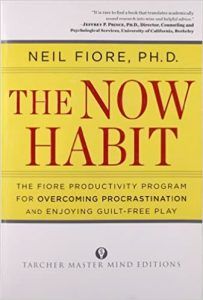
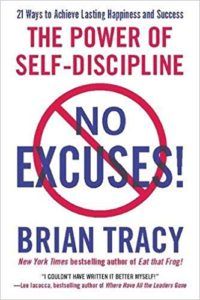 3. No Excuses!: The Power of Self-Discipline – Brian Tracy
3. No Excuses!: The Power of Self-Discipline – Brian Tracy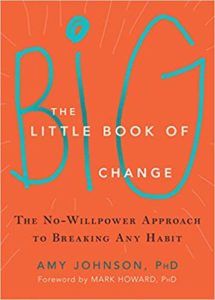 2. The Little Book of Big Change: The No-Willpower Approach to Breaking Any Habit – Amy Johnson PhD and Mark Howard PhD
2. The Little Book of Big Change: The No-Willpower Approach to Breaking Any Habit – Amy Johnson PhD and Mark Howard PhD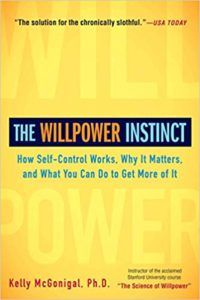 4. The Willpower Instinct: How Self-Control Works, Why It Matters, and What You Can Do to Get More of It – Kelly McGonigal
4. The Willpower Instinct: How Self-Control Works, Why It Matters, and What You Can Do to Get More of It – Kelly McGonigal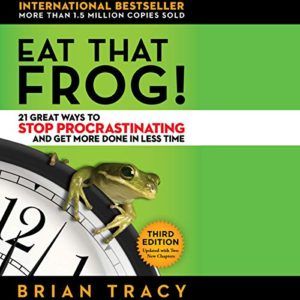 1. Eat That Frog! 21 Great Ways to Stop Procrastinating and Get More Done in Less Time – Brian Tracy
1. Eat That Frog! 21 Great Ways to Stop Procrastinating and Get More Done in Less Time – Brian Tracy 2. Smart but Scattered Teens: The “Executive Skills” Program for Helping Teens Reach Their Potential – Richard Guare PhD, Peg Dawson EdD and Colin Guare
2. Smart but Scattered Teens: The “Executive Skills” Program for Helping Teens Reach Their Potential – Richard Guare PhD, Peg Dawson EdD and Colin Guare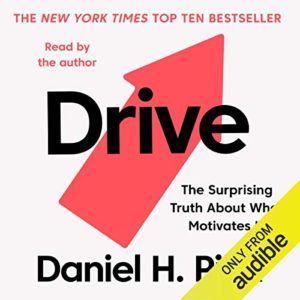 3. Drive: The Surprising Truth About What Motivates Us – Daniel H. Pink
3. Drive: The Surprising Truth About What Motivates Us – Daniel H. Pink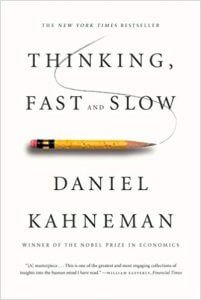 3. Thinking, Fast and Slow – Daniel Kahneman, Patrick Egan and Random House Audio
3. Thinking, Fast and Slow – Daniel Kahneman, Patrick Egan and Random House Audio